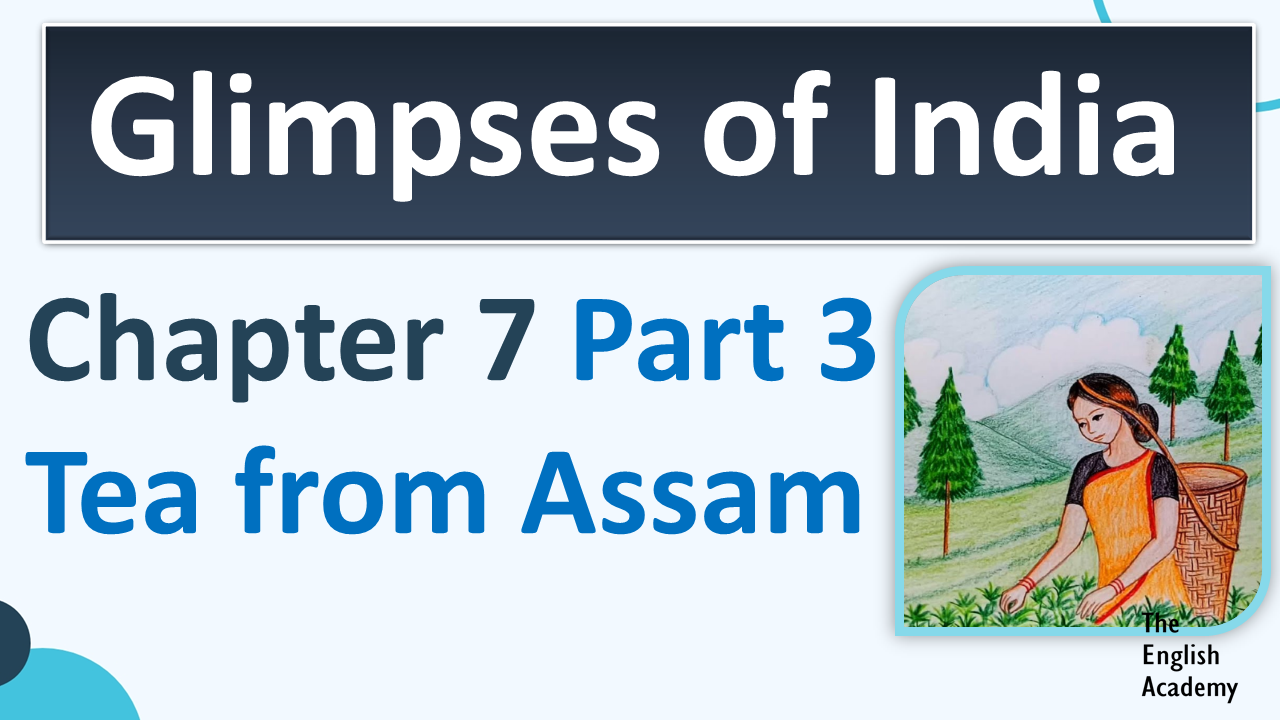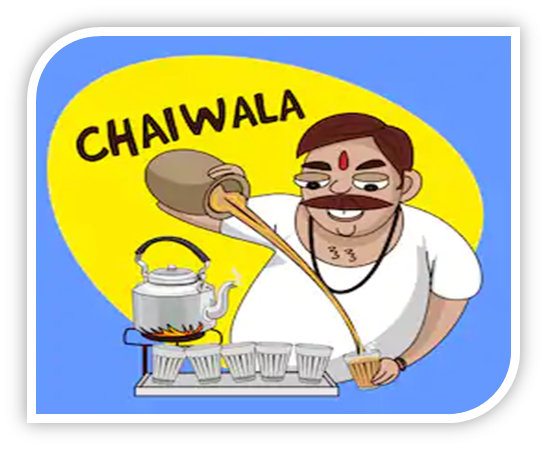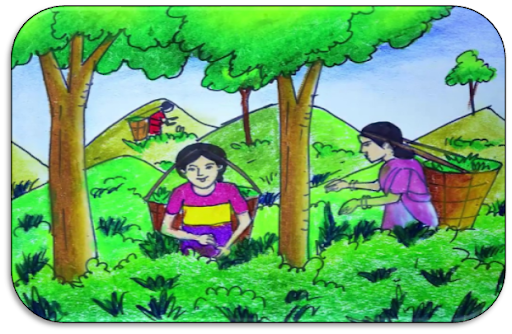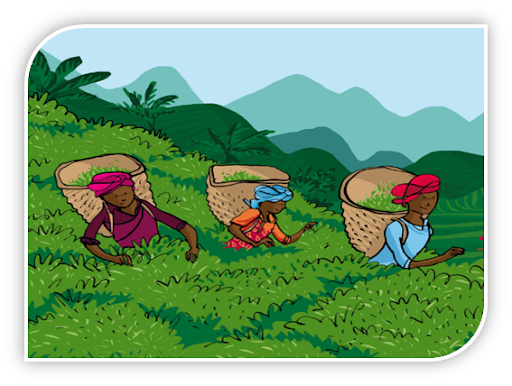Class-X-Chapter-7 (First Flight)-"Glimpses of India" Part -3 "Tea from Assam"-By Arup Kumar Dutta
Glimpses of India (Part 3) Tea from Assam
By Arup Kumar Dutta
Pranjol, a youngster from Assam, is Rajvir’s classmate at school in Delhi. Pranjol’s father is the manager of a tea-garden in Upper Assam and Pranjol has invited Rajvir to visit his home during the summer vacation

"Tea from Assam"- Introduction
The lesson is about two friends- Pranjol and Rajvir who are travelling to Pranjol’s hometown Assam for the summer vacation. Assam is known as the ‘tea country’. It has the largest concentration of plantations in the world. During their journey they discuss about the various ‘legends’ that are known to have discovered tea. The story tells us about the popularity of tea as a beverage.
"Tea from Assam" -Summary
The story revolves around the infamous beverage ‘tea’ telling us more about its history and discovery. It begins from the scene where two friends, Pranjol and Rajvir are set to go to Assam, Pranjol’s hometown when a tea vendor asks them if they would like to have some freshly made tea. They buy two cups joining almost every other person in their compartment. From there, the journey begins and Pranjol starts reading his detective book while Rajvir decides to enjoy the scenic beauty. There were soft green paddy fields followed by tea bushes. Rajvir is very excited on seeing such large plantations of tea but Pranjol is unable to match the same level because he was born and brought up in Assam, famously known as the ‘Tea country’. Visiting there for the first time, Rajvir did a lot of study about how tea was discovered and that it dates back to 2700 B.C. According to what he read, it was first consumed in China and reached Europe in the 16th century, where it was mostly popular for it’s medicinal properties. There are numerous stories as to how it was discovered, one about a Chinese Emperor and the other about a Buddhist monk. The former liked the taste of it while the latter, used it to get rid of sleep. As they were having this discussion, they reached their destination where Pranjol’s parents had come to receive them and take them to their tea garden. On their way, they passed a cattle bridge and gave way to a truck filled with tea leaves which drew their attention to the fact that it was the second sprouting season. Rajvir, indeed did a lot of study before coming which impressed Pranjol’s father and he intended to learn a lot more.
Text & Explanation
“CHAI-GARAM... garam-chai,” a vendor called out in a high-pitched voice. He came up to their window and asked,”Chai, sa’ab?” “Give us two cups,” Pranjol said. They sipped the steaming hot liquid. Almost everyone in their compartment was drinking tea too. “Do you know that over eighty crore cups of tea are drunk every day throughout the world?” Rajvir said. “Whew!” exclaimed Pranjol. “Tea really is very popular.”

The scene is set on a train station where a tea vendor asks the two friends if they would like to buy some freshly-made hot tea. They decide to have two cups of tea joining almost everyone else in their compartment. With this, Pranjol highlights the fact that “almost eighty crore cups of tea are consumed everyday throughout the world” while Rajvir remains surprised on listening to it. Indeed, tea is a popular beverage all over the world.

The train pulled out of the station. Pranjol buried his nose in his detective book again. Rajvir too was an ardent fan of detective stories, but at the moment he was keener on looking at the beautiful scenery. It was green, green everywhere. Rajvir had never seen so much greenery before. Then the soft green paddy fields gave way to tea bushes. It was a magnificent view. Against the backdrop of densely wooded hills a sea of tea bushes stretched as far as the eye could see. Dwarfing the tiny tea plants were tall sturdy shade-trees and amidst the orderly rows of bushes busily moved doll-like figures.
Paddy fields- a field where rice is grown
As soon as the train started moving, Pranjol got engaged in reading his detective book. Both the friends were huge fans of detective books but Rajvir chose to look at the scenic beauty at the moment. There was greenery all around, something Rajvir had never seen before. After the green paddy fields, came tea plantations. As far as he was able to look, only tea bushes were visible so much so that the narrator compared it to a ‘sea’ of tea bushes. In the background, there were hills with dense forests. In between the tea plantations, there were orderly rows of tall and strong trees that were moving because of the wind. It was an amazing view.
In the distance was an ugly building with smoke billowing out of tall chimneys. “Hey, a tea garden!” Rajvir cried excitedly. Pranjol, who had been born and brought up on a plantation, didn’t share Rajvir’s excitement. “Oh, this is tea country now,” he said. “Assam has the largest concentration of plantations in the world. You will see enough gardens to last you a lifetime!”
Before visiting the Tea country, Rajvir read a lot about tea and how it was discovered. There were numerous theories and one of which was about a Chinese Emperor who had a habit of drinking boiled water. Once upon a time when he was boiling that water, few leaves fell into it and it tasted delicious. It is said that those leaves were tea leaves.
“Tell me another!” scoffed Pranjol. “We have an Indian legend too. Bodhidharma, an ancient Buddhist ascetic, cut off his eyelids because he felt sleepy during meditations. Ten tea plants grew out of the eyelids. The leaves of these plants when put in hot water and drunk banished sleep. “Tea was first drunk in China,” Rajvir added, “as far back as 2700 B.C.! In fact words such as tea, ‘chai’ and ‘chini’ are from Chinese. Tea came to Europe only in the sixteenth century and was drunk more as medicine than as beverage.”
Ascetic- characterized by severe self-discipline and abstention from all forms of indulgence, typically for religious reasons.
Banished- get rid of
On being asked by Pranjol, Rajvir told another story about an Indian legend named Bodhidharma. He was a Buddhist monk who had cut his eyelids because he used to feel sleepy while meditating. Eventually, tea plants grew out of his eyelids which upon consuming after boiling with water helped in getting rid of sleep. Further, Rajvir highlighted a few facts that stated that tea dates back to 2700 B.C. and was first consumed in China. All such words such as ‘chai and ‘chini’ have originated from Chinese language. Tea was introduced to Europe quite late- in the sixteenth century where it was considered to have medicinal properties.

The train clattered into Mariani junction. The boys collected their luggage and pushed their way to the crowded platform. Pranjol’s parents were waiting for them. Soon they were driving towards Dhekiabari, the tea-garden managed by Pranjol’s father . An hour later the car veered sharply off the main road. They crossed a cattle-bridge and entered Dhekiabari Tea Estate.
The train had stopped and the boys reached their destination where they gathered their luggage and de-boarded the train only to find a platform that was too crowded. Pranjol’s parents had come to receive them. After almost an hour, they reached Dhekiabari, Pranjol’s tea garden after taking a turn and making their way through a cattle-bridge.
On both sides of the gravel-road were acre upon acre of tea bushes, all neatly pruned to the same height. Groups of tea-pluckers, with bamboo baskets on their backs, wearing plastic aprons, were plucking the newly sprouted leaves.
Their tea garden was stretched upon a vast area of land. All the bushes were cut to the same height and they had been taken care of. On the fields, tea pluckers were seen wearing an apron and carrying the bamboo baskets in order to pluck the freshly-sprouted leaves.

Pranjol’s father slowed down to allow a tractor, pulling a trailer-load of tea leaves, to pass. “This is the second-flush or sprouting period, isn’t it, Mr Barua?” Rajvir asked. “It lasts from May to July and yields the best tea.” “You seem to have done your homework before coming,” Pranjol’s father said in surprise. “Yes, Mr Barua,” Rajvir admitted. “But I hope to learn much more while I’m here.”
Sprouting period- when a plant sends out new growth (second harvest of tea leaves in a season)
On their way to the fields, Pranjol’s father gave way to a tractor that was loaded with tea leaves. On seeing this, Rajvir flaunts his knowledge by mentioning that this is the second sprouting period of the year that lasts from May to July and gives excellent yield. Pranjol’s father, who seems impressed, replies that he seems to have done a lot of research before coming. Pranjol, who was excited about learning more about the amazing beverage showed his intention for the same.
Grammar Exercises
1. Look at these words: upkeep, downpour, undergo, dropout, walk-in. They are built up from a verb (keep, pour, go, drop, walk) and an adverb or a particle (up, down, under, out, in). Use these words appropriately in the sentences below. You may consult a dictionary.
- A heavy __________ has been forecast due to low pressure in the Bay of Bengal.
- Rakesh will __________ major surgery tomorrow morning.
- My brother is responsible for the __________ of our family property.
- The __________ rate for this accountancy course is very high.
- She went to the Enterprise Company to attend a __________ interview.
Answers-
- A heavy downpour has been forecast due to low pressure in the Bay of Bengal.
- Rakesh will undergo major surgery tomorrow morning.
- My brother is responsible for the upkeep of our family property.
- The dropout rate for this accountancy course is very high.
- She went to the Enterprise Company to attend a walk-in interview.
2. Now fill in the blanks in the sentences given below by combining the verb given in brackets with one of the words from the box as appropriate.
Over, by, through, out, up, down
- The Army attempted unsuccessfully to __________ the Government. (throw)
- Scientists are on the brink of a major __________ in cancer research. (break)
- The State Government plans to build a __________ for Bhubaneswar to speed up traffic on the main highway. (pass)
- Gautama’s__________ on life changed when he realised that the world is full of sorrow. (look)
- Rakesh seemed unusually__________ after the game. (cast)
Answers-
- The Army attempted unsuccessfully to overthrow the Government. (throw)
- Scientists are on the brink of a major breakthrough in cancer research. (break)
- The State Government plans to build a by-pass for Bhubaneswar to speed up traffic on the main highway. (pass)
- Gautama’s outlook on life changed when he realised that the world is full of sorrow. (look)
- Rakesh seemed unusually downcast after the game. (cast)
3. Think of suitable -ing or -ed adjectives to answer the following questions. You may also use words from those given above. How would you describe
- a good detective serial on television?
- a debate on your favourite topic ‘Homework Should Be Banned’?
- how you feel when you stay indoors due to incessant rain?
- how you feel when you open a present?
- how you feel when you watch your favourite programme on television?
- the look on your mother’s face as you waited in a queue?
- how you feel when tracking a tiger in a tiger reserve forest?
- the story you have recently read, or a film you have seen?
Answers-
- a good detective serial on television? Interesting
- a debate on your favourite topic ‘Homework Should Be Banned’? Exciting
- how you feel when you stay indoors due to incessant rain? Bored
- how you feel when you open a present? Excited
- how you feel when you watch your favourite programme on television? Interested
- the look on your mother’s face as you waited in a queue? Tired
- how you feel when tracking a tiger in a tiger reserve forest? Thrilled
- the story you have recently read, or a film you have seen? Boring
Extract Based Questions
Question 2. It was a magnificent view. Against the backdrop of densely wooded hills, a sea of tea bushes stretched as far as the eye could see. Dwarfing the tiny tea plants were tall sturdy shade-trees and amidst the ordely rows of bushes busily moved doll-like figures. In the distance was an ugly building with smoke billowing out of tall chimneys. ‘Hey, a tea garden !’, Rajvir cried excitedly.
Short Answer Type Questions
Question 7. How are the tea-pluckers different from
the other farm labourers’ ?
Answer:
Tea pluckers are
different from the other farm labourers as the tea pluckers are hired labourers
whereas the farm labourers can be hired or can be the owners of the land. Tea
pluckers just pluck leaves whereas farm labourers go through the whole process,
i.e., from sowing to harvesting.
Question 8. Describe the magnificent views of tea
estate with reference to the lesson “Tea
from Assam”.
Answer:
The view around
the tree estate was magnificent. There was greenery all round. Against the
backdrop of densely wooded hills, a sea of tea bushes stretched as far as the
eye could see.
Question 10. ‘This is a tea country now’. Explain this with reference to Assam. [CBSE 2013]
Answer: Assam has the world’s largest
concentration of tea plantations in the world. A large number of tea gardens
can be found there. Most of the tea grown in Assam is supplied all over the
world.
.
Long Answer
Type Questions (100-120 words )

Comments
Post a Comment